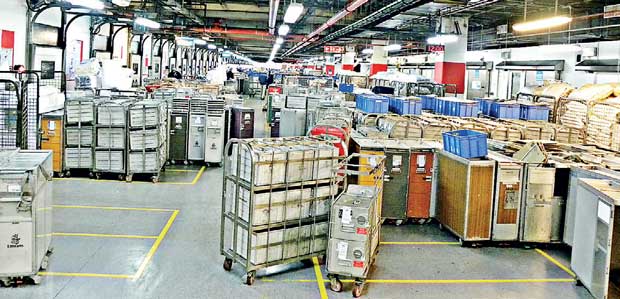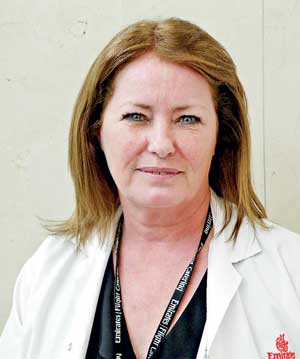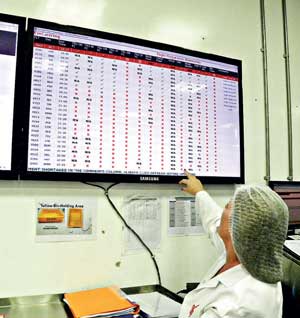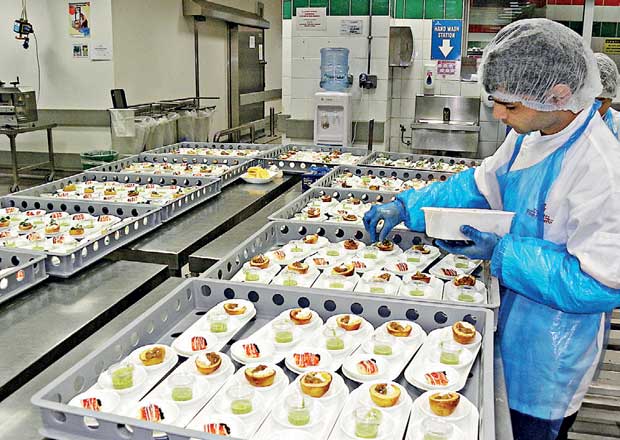28 Dec 2017 - {{hitsCtrl.values.hits}}

By Chamindra Wickramasinghe
Emirates Flight Catering (EKFC), the Emirates Airline’s catering facility in Dubai, the largest of its kind in the world, has a capacity of preparing over 175,000 meal trays a day, although it was initially ready only for 115,000.

On an average day, EKFC, which includes two airline catering facilities at Dubai International Airport – EKFC1 and EKFC2 – caters to 504 flights. Everything for Emirates flights alone is done at EKFC1 and it handles 254 flights a day; EKFC2 is for other airways, corporate clients and all lounges at the airport and handles 250 flights a day.
The massive operation in the sprawling premise in 2016 supplied 59 million meals for Emirates flights and 9.195 million for other airlines.
Menu cycles
Emirates runs two menu cycles for a month. They could be seen displayed on a wall – the appetizers to match the meals and all the deserts served to all the different routes and destinations.

EKFC Operations Manager Jane Zdrojewski said, “There is a regional catering manager for Emirates in each zone and they are chefs by history. In between the cycles, they will work with the team here to what menu and what item they would put on. The cabin crew can give us direct feedback from the passengers”, for instance what items are unpopular on the menu.
“We watch for trends, so when we see a trend, we readdress that item; it could be even related to the spiciness of a particular item. If they really don’t like it, it will be replaced with something else.”
The Emirates team works on the menu between seven to eight months before it goes live onboard “because you need to go through the whole process – do the testing, do the sampling. To get the products, there is a long procedure and process involving the central procumbent department.
If they ask for a chocolate spread for children, we just do not go and buy Nuttela. We would go to various suppliers and their samples would be put in front of Emirates; they would negotiate prices and get to one supplier. It is all about quality, price, availability and the ability to meet the demand to cater to hundreds of thousands.”
Fresh fruit being seasonal, the team constantly chases the growing optimum of different fruits. “So, one month you would get the strawberries from Australia, the next month we would get them from Spain and another month we would get them from Brazil.”
Every April the menus are changed, she said.

Safety, freshness assured
In the hot kitchen, where the main part of the meal is made, at one end is the kitchen for Far East and subcontinent food preparation – traditional spice-mixed curries are done there. At another end is the kitchen for Arabic and continental food.
“All food preparation is done making sure it is safe onboard,” Zdrojewski said.
Emirates has the capability to do food testing documentation from beginning to end. “We know what the product is, where it came from, what temperature, who has handled it, what time it was received, right up to onboard the aircraft.
Everything must be Halal. The whole kitchen is Halal; all our suppliers should have Halal products. They must have the certification.”
Food for the cabin crew is prepared in the same place. “We did a survey recently and we asked the cabin crew what they like because there are 60 to 70 different nationalities. One of the things that came up was they wanted healthier options and a variety.
So, if we have 24 cabin crew, we would have some soups, some porridge, some sandwiches, some products to make a salad or to make a sandwich, so they can make what they want or we would provide cornflakes, chocolate bars, bananas – they can just grab and eat.”
In the production section is also everything that Emirates sends onboard the aircraft under the ‘non-menu recipe’. It ranges from juices, water bottles, Champaign, cereals to biscuits and jams.
The whole area has recyclable items. Zdrojewski said, “When things go onboard the aircraft, what is not used come back to the units. They are quality checked and repacked back to the standard required. Any type of thing that does not require refrigeration and not opened, such as unused Champaign bottles, we will use again. If it is opened, we will destroy.”
Emirates makes sure things are served fresh. “There’s nothing that we do to the fruit (we serve) that will happen in a hotel or in a restaurant. No additives, no preservatives. It’s basically cut, sliced, plated and sent onboard.”
Every little chocolate decoration on a premium class plate is done in the EKFC1 itself; every muffin to biscuit is made there. Five hundred and fifty to 600 chefs work at EKFC1 alone.
On the day, some workers were seen plating black and red currents – their work Zdrojewski said is evaluated for a reward system – Najem Awards, which goes from Gold and Bronze standards up to CEO’s awards.
“We want every dish to look alike. The supervisor would be doing the final check,” she said.
Four hours before the flight departs, everything got to be ready at the downstairs airside logistics. Failure to meet the requirements, five hours before the flight departure, a preparation monitoring board would display red warning lights.
Besides food safety, for Emirates, it is all about health and safety; one among many measures taken was the workers being provided with mats to stand on, which are specifically designed for heath purposes as the work of some requires standing for a few hours at a stretch, arranging items.
Automated equipment handling
The EKFC building incorporates the latest systems in food production and automated equipment handling, with a workforce of over 9,900 persons in total.
“We wash three and a half million pieces of equipment every day,” Zdrojewski said.
There is an automated overhead cart transport system or monorail designed to transport the meal carts from the vehicle off-loading bay area to the dishwashing area. Equipment such as cutlery, crockery and glassware are washed there.
The meal carts are manually stripped. The empty carts are then transported to the mezzanine floor, where they are washed and sanitised in the cart washing machine.
The carts are moved on motorised carriers on a fixed non-moving rail system. The meal trays, oven racks and standard units are also transported around the facility on the monorail.
The system features the latest technology in the industry; the noise level is much lower than the continuous moving belt adopted in older ‘power and free’ systems – the speed is approximately four to eight times higher.
In the Warewash, an average of three million items of dirty equipment are processed each day; as soon as the trollies are received from the aircraft, they are segregated between food, beverages and Duty Free trollies. There is a series of specially designed machines to wash the equipment.
The equipment is moved around utilizing an electric monorail cart transport overhead conveyor system. The premise occupies 2.55 kilometres of monorail lines and handles over 20,000 meal carts, 3,000 bar carts and 14,000 standard unit containers a day.
After washing, the system transports the meal carts to a buffer zone for storage. Upon user request, the system automatically transports the requested number of trolleys from the storage area to the store preparation or meal pre-setting area.
EKFC, a US $ 159 million facility and an ISO 9001: 2008 Certified Company, also has a dedicated environmental team who recover recyclable material from the inbound waste stream.
24 Nov 2024 1 hours ago
24 Nov 2024 1 hours ago
24 Nov 2024 2 hours ago
24 Nov 2024 7 hours ago
24 Nov 2024 8 hours ago